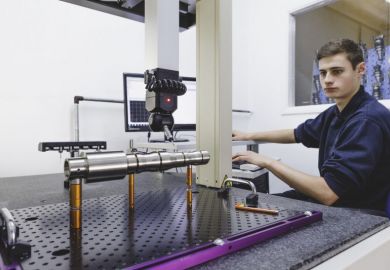For some time, UK chancellor of the Exchequer Philip Hammond’s first Budget will be remembered for the rise in National Insurance contributions for the self-employed – and its rapid reversal a week later amid claims that it breached pre-election promises. But, over time, Hammond will hope that it might also be remembered for technical education reform.
The unveiling of £500 million to support new technically focused “T” levels as an alternative to academic A levels followed January’s announcement of £170 million for new Institutes of Technology to deliver higher-level technical education. There were also new learner loans and clearer estimates of the income expected to be raised from the new apprenticeship levy, which all large companies must pay to help fund apprenticeships. Taken all together, these might finally deliver on long-held ambitions for a world-class technical education system and to narrowing the productivity gap in what Theresa May has called an “economy that works for everyone”.
A recent report from the Institute for Government, All Change: Why Britain is so Prone to Policy Reinvention, and What Can Be Done About It, says that T levels represent the 29th major attempt to reform vocational education since the early 1980s – during which time no organisation has survived longer than a decade. I worked on reform attempts 19, 21, 22 and 23, so I know failure when I see it.
Time may not be on anyone’s side. It will be 2022 before the full range of T levels are available, so it will be at least 2024 before people with them start entering the workforce. By then, the record suggests that the new agencies overseeing reform may already have been consigned to history – as may the politicians who established them.
Although UK universities are experiencing their own period of churn, with the Higher Education and Research Bill passing through Parliament, it’s a sector that has had comparatively less policy intervention; one of the main arguments for the bill is that the current regulatory regime dates from 2004. But look closely and there are plenty of reasons for higher education to take an interest in this latest round of vocational reform.
First, these are qualifications that will provide entry to higher education. Academics and university leaders were involved in last year’s report on technical education by Lord Sainsbury of Turville, on which the government’s proposals are based. And they will be involved in designing the 15 T-level routes (down from 13,000 existing different qualifications). In recent years, progression from technical qualifications to higher education has increased significantly: new qualifications – and any disruption along the way – will therefore affect universities.
Second, the Budget’s wider proposals apply more directly to the kinds of higher education likely to be available in England. There are new loans for learners on advanced technical learning. Most universities are required to pay the apprenticeship levy, which goes live in April. And the Association of Employment and Learning Providers estimates that at least half of these funds will be spent on degree-level apprenticeships. For all the talk in the higher education bill of challenger institutions competing with universities, a much more significant reshaping of higher education could be emerging here. According to January’s Industrial Strategy Green Paper, the UK needs more applied research as well as better technical skills. So the Department for Business, Energy and Industrial Strategy should become a proper partner to the Department for Education and be equally responsible for developing and funding the strategy. So far, there is no suggestion of how institutes of technology, or a wider sector, might emerge. But it is clear that universities must play a major part. With their involvement, the institutes could bring higher technical skills together with applied research, energising this new sector and driving parity of esteem with higher education.
As a recent Times Higher Education leader underlined, that parity of esteem has previously proved elusive – perhaps because technical and academic routes have been separated rather than intertwined. But with better connections between technical education and research, perhaps the UK can more effectively broaden and deepen its higher education offer alongside underwriting the quality and longevity of its new technical sector. That way, it will better avoid the likelihood of more failed reforms in either.
Andy Westwood is professor of further and higher education at the University of Wolverhampton and co-director of Policy@Manchester at the University of Manchester.
POSTSCRIPT:
Print headline: Vocation, vocation, vocation
Register to continue
Why register?
- Registration is free and only takes a moment
- Once registered, you can read 3 articles a month
- Sign up for our newsletter
Subscribe
Or subscribe for unlimited access to:
- Unlimited access to news, views, insights & reviews
- Digital editions
- Digital access to THE’s university and college rankings analysis
Already registered or a current subscriber?









